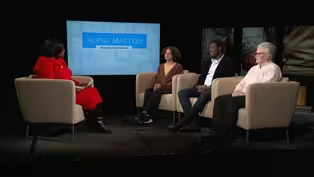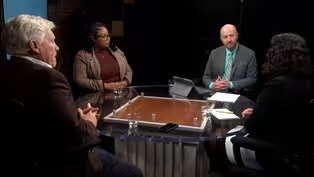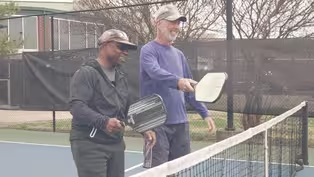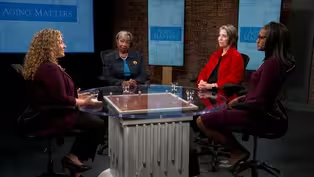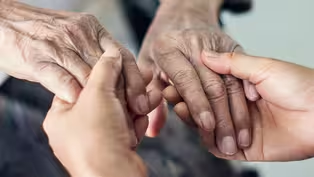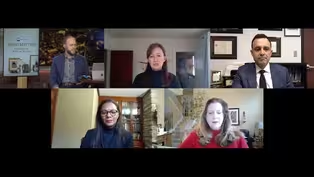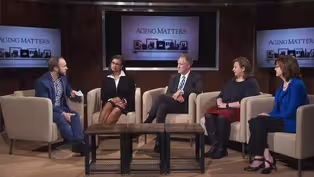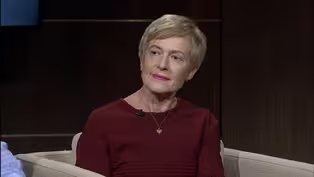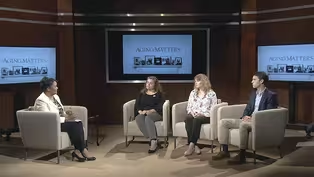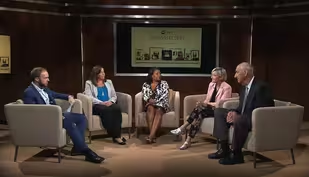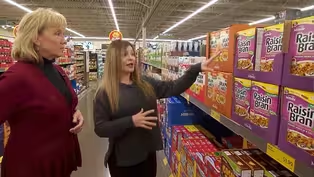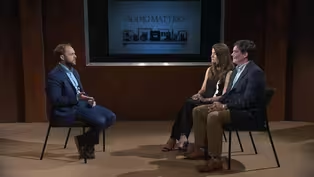
LGBTQIA+ Resources in Middle Tennessee
Special | 26m 46sVideo has Closed Captions
A discussion of health and social services available for older Middle TN LGBTQIA+ adults.
LGBTQIA+ older adults face unique social and health disparities that can impact overall well-being. A panel hears real-life stories and discusses some of the resources available to community members in Middle Tennessee–from social programs combating loneliness and isolation to LGBTQIA+-centered faith services and efforts to connect patients to competent, affirming health care providers.
Problems playing video? | Closed Captioning Feedback
Problems playing video? | Closed Captioning Feedback
Aging Matters is a local public television program presented by WNPT

LGBTQIA+ Resources in Middle Tennessee
Special | 26m 46sVideo has Closed Captions
LGBTQIA+ older adults face unique social and health disparities that can impact overall well-being. A panel hears real-life stories and discusses some of the resources available to community members in Middle Tennessee–from social programs combating loneliness and isolation to LGBTQIA+-centered faith services and efforts to connect patients to competent, affirming health care providers.
Problems playing video? | Closed Captioning Feedback
How to Watch Aging Matters
Aging Matters is available to stream on pbs.org and the free PBS App, available on iPhone, Apple TV, Android TV, Android smartphones, Amazon Fire TV, Amazon Fire Tablet, Roku, Samsung Smart TV, and Vizio.
Providing Support for PBS.org
Learn Moreabout PBS online sponsorshipMore from This Collection
Learn more about the issues facing an aging population from a panel of experts and community members discussing various topics on aging for Nashville Public Television original series NPT Reports: Aging Matters.
Raised by Grandparents Panel Discussion
Video has Closed Captions
Individuals discuss both the challenges and the benefits of being raised by grandparents. (25m 8s)
Affordable Housing in Nashville
Video has Closed Captions
As the cost of housing surges in Nashville, we pause to consider a more affordable future. (26m 46s)
Video has Closed Captions
A discussion about making the most of our time and abilities as we age. (26m 46s)
Video has Closed Captions
Experts discuss what has to change to give older women the quality of life they deserve. (26m 46s)
Long-Term Care: Know Your Options
Video has Closed Captions
A conversation exploring long-term care options in Tennessee and their affordability. (26m 46s)
Video has Closed Captions
Experts discuss how older adults can stay safer-at-home during the COVID-19 pandemic. (27m 9s)
Legal Help Panel Discussion | Aging Matters | NPT Reports
Video has Closed Captions
NPT’s Aging Matters: Legal Help sheds light on resources for legal assistance. (27m 24s)
Hospitals & Health Risks Panel Discussion | Aging Matters
Video has Closed Captions
A panel of experts discusses strategies for a safe hospital stay. (28m 39s)
Loneliness & Isolation Panel Discussion | Aging Matters
Video has Closed Captions
Brent Elrod, Gretchen Funk and Andrea Prince discuss issues of loneliness and isolation. (28m 32s)
Dental Health Panel Discussion | Aging Matters
Video has Closed Captions
Experts discuss SMILE ON 60+, an initiative aiming to improve oral health in older adults. (27m 16s)
Video has Closed Captions
Aging Matters: Practical Nutrition offers simple tips and advice. (28m 31s)
Aging & the Workplace Panel Discussion | Aging Matters | NPT
Video has Closed Captions
Aging & the Workplace Panel Discussion (32m 59s)
Providing Support for PBS.org
Learn Moreabout PBS online sponsorship- While we all face challenges as we get older, LGBTQIA+ community members face unique social and health disparities as well.
SAGE, a national organization that supports LGBTQ+ older adults, shared that nine out of 10 LGBTQ+ people fear discrimination in care settings if providers knew their sexual orientation or gender identity.
And according to a 2020 report from National Academies, LGBTQ+ older adults are three to four times less likely to have children, twice as likely to live alone, and twice as likely to be single.
So competent, affirming healthcare providers and services available to combat loneliness and isolation are important topics for us to address as a society.
And we're here now to discuss resources available in Middle Tennessee for LGBTQIA+ older adults.
I'm David Plazas, Director of Opinion and Engagement at The Tennesseean.
And I'm joined by panelists Del Ray Zimmerman, Director of the Program for LGBTQ health at Vanderbilt University Medical Center; Gretchen Funk, Chief Program Officer at FiftyForward, Reverend Dawn Bennett, Pastor Developer at The Table; and Olivia Hill, a Community Leader.
- [Announcer] Major funding for Aging Matters is provided by the West End Home Foundation, enriching the lives of older adults through grant making, advocacy, and community collaboration.
The Jeanette Travis Foundation, dedicated to improving the health and wellbeing of the Middle Tennessee community.
The HCA Healthcare Foundation on behalf of TriStar Health.
Cigna.
Together all the way.
Additional funding provided by Jackson National Life Insurance Company, The Community Foundation of Middle Tennessee, and by members of NPT.
Thank you.
- So I just mentioned some stats that help us understand the issues we're gonna cover at a high level, but sometimes hearing from an individual is the best way to really put things into perspective.
We have a clip here from National Public television's documentary Aging with Pride that shows a fellow Nashvillian's concerns about finding an affirming healthcare provider.
Let's take a look.
(upbeat guitar strumming) ♪ If you were me, what would you do?
♪ - Having moved to Nashville, I have a doctor here who I like and who is very inclusive and doesn't, you know, there's no issue there, but I've said to my wife, I don't know what hospital to go to.
I don't know if Vanderbilt or St. Thomas or whatever is the best hospital for an old trans person.
♪ Wicked secrets locked up in his head ♪ You know, you take off my clothes and I'm there, and you know who I am.
I do have that concern, and I don't wanna presume this, but maybe I am.
I think it's harder for a trans person than it is a gay person.
♪ Are you a boy or are you a girl?
♪ - So there's a lot to discuss in Cidny's comments that I'll say we're really gonna have a great conversation, but we'll only be able to scratch the surface on these issues, but I want to turn to you first, Del Ray.
After watching this clip, are these concerns you frequently hear in your work at the program for LGBTQ health at Vanderbilt Medical Center.
- David, yes, these are concerns that we hear quite frequently, and Vanderbilt's been working for quite some time to put systems in place that address these concerns.
As a matter of fact, our program for LGBTQ health was founded from a call from medical students who spoke up and said that they weren't getting the education that they needed to be able to take care of sexual and gender minority patients.
So that's actually where our program was founded, was around intentionally providing those curricular elements and putting those in place.
And so today, we actually regularly lecture in the School of Medicine, School of Nursing, and other schools in the area.
So we quite frequently go to Meharry College of Medicine, as well as Belmont School of Nursing.
We also provide lots of clinical education throughout the medical center to make sure that our teams are up to date on issues surrounding cultural competency, known health disparities, and just best practices for treating LGBTQ patients.
- Well, thank you.
On that topic of finding care, if a patient is looking for affirming, competent care, what should they do?
- We love to hear from LGBTQ patients, and we are set up to hear from them every day.
So folks can either call us.
Our number is 615-936-3897.
Or they can email us at lgbtq.health@vumc.org.
And we are able to help patients in the area navigate health services, whether it's at Vanderbilt or not.
Our main interest is just connecting people to the healthcare resources that they need.
- And Cidny had talked about this in this bit, but could you talk a little bit more about what other programs and what other services you offer at the LGBTQ Health at VUMC?
- Sure, we certainly offer primary care, and today, we have a full scope of gender affirming services as well.
And I think we're filling a really unique gap between Chicago and Miami.
We actually have a full scope of surgical services that folks can access, and we are hearing from patients all across the region.
And over the next five to 10 years, we're really looking to establish a center of excellence in LGBTQ health.
And that's gonna have implications on our clinical care as well as our ability to conduct research and steward education throughout the region, too.
- Thank you, Del Ray.
I want to turn to Olivia now to talk a little bit about the Trans Buddy Program.
I understand you are involved in it, and I wanna know more about the program and how you became a volunteer.
- I guess I'd have to say it started all out as a patient, and I remember the very first time I went to go see my endocrinologist, and I don't really remember anything.
I was so overcome with emotion and everything, and I walked out and I was scared.
I didn't know what to do.
And then I later found out about the Trans Buddy Program and what it does is if you need to go see a doctor for any reason within Vanderbilt Medical Center, then you call the Trans Buddy hotline and someone will come sit with you.
And it doesn't matter if you've got a broken finger or you're going for gender affirming care or whatever.
It's just to have somebody sit with you, and to be able to sit with somebody and either sit with them or sit and hold their hand and help them through that first little bit of a process is just absolutely amazing.
It's one of the most, it's the most fun thing I do in my life is to watch people start their journey.
- Can you talk a little bit about your approach to helping people become comfortable or to stand up for them when they're seeking care?
- Yeah, so I just try to go through and let people know that I've been through the program, too, and that I have had a lot of pitfalls along the way, just like all of us.
And that seems to tend to kind of relax people a little bit when they realize that somebody's on your side with you.
- Thank you.
We know that healthcare isn't the only concern that rises to the surface among older LGBTQIA+ adults.
In 2019, Nashville Pride led the Nashville and Middle Tennessee Community Visioning Project.
Nearly 2,500 individuals were surveyed, and 65% of participants reported that specific programming and resources for LGBTQIA+ older adults is a priority for Middle Tennessee.
Let's hear what another community member featured in Aging with Pride had to say about what might be behind increased feelings of loneliness and isolation for LGBTQIA+ older adults.
- You know, for gay people, we may have our friends, if we have a partner, you know, the partner dies.
You know, you don't really have the same type of family around that you might otherwise have, but I think the loneliness and isolation is a huge problem for everyone at our age, really.
- Gretchen, I know you were involved with the Community Visioning Project, and in your work with FiftyForward, you manage social activities for older adults, activities that help combat loneliness and isolation.
What did you learn about the hopes of LGBTQIA+ Middle Tennessee residents from your involvement in this project?
- So FiftyForward's mission is to support, champion, and enhance life for older adults, and our aim is to serve all older adults in all communities.
And it was really a pleasure to participate in the Community Visioning Project.
FiftyForward Madison Station hosted one of the listening sessions, which was exciting.
And then I had the opportunity to co-chair the Older Adult Task Force that looked at specific recommendations regarding older adults in the LGBT community.
And I did that with Joe Interrante, which was a great pleasure to work with Joe.
At the same time, just coincidentally, FiftyForward undertook an effort to take a look at communities like the LGBT community and the Hispanic community to see what were the needs.
So our aim is always to enhance what is available, not to duplicate.
So we wanted to hear from community members, were there needs that were unmet in the LGBT community?
Were there ways that FiftyForward could help?
And what we heard both through the Visioning Project and through our own work was that in our talks, 100% of the people we spoke with felt that older adults in the community were unprepared for aging.
I think that's very typical for older adults in general, but we know that older adults in particular communities face extra challenges.
So you look at needs like housing and economic development and other things like transportation, every older adult faces those challenges.
If you're in a group that's underrepresented, those challenges are even tougher.
So we knew we wanted to address those things.
We also knew that things came up through the process like a desire for affinity groups, a desire to really be seen and heard and have a space to come together, both with older adults in general, but with each other, a desire for support and access to vetted resources.
So the idea being you could walk into a residential facility and have no idea whether you'd be seen as a person or whether there might be some stigmatizing that could go on.
So the things that FiftyForward has done so far, we hosted a panel in June of 2021.
So we look to elevate the voices of older adults.
You know, there was that message that we wanna be seen.
So in the LGBTQ community, a lot of the strides that have been made are due to folks that are now in that older adult age range, but in our community in general, older adults can be sort of shunted aside.
So we hosted a panel called LGBTQ Voices of Nashville.
So it was at that time, and many things were online, and so we were able to elevate voices that way.
We began a peer support group, which has now morphed into a peer group, and I think is gonna continue to morph because the idea is that at that point there was online support that was available and possible because of the time we were in.
But I think that that group is gonna continue to grow and lead itself, and FiftyForward will sponsor that.
We are in the process now of looking at the recommendations of the Visioning Project Older Adult Task Force, and we are putting together an Elders Advisory Group.
So that group will be coming together in the next month and really look at things like pursuing a SAGE affiliation.
So developing programs that could meet SAGE's sort of guidelines and best practices around service to older adults.
So we really wanna be a space where all older adults can come together and especially groups that maybe don't have that space right now.
- Could you talk a little bit about your collaboration with PFLAG on virtual awareness and inclusion?
- So FiftyForward, saying that we want to be welcoming and inclusive is one thing.
Really living that out and being intentional about that.
We know that we all wanna be understood.
There are things to understand about specific communities, whether it's the Hispanic community and the need to be Spanish speaking and Spanish welcoming, or the LGBTQ community and the special needs that might exist there, special things around language.
We all want to be referred to the way that we want to be referred to.
Older adults are the same.
You know, we made a pivot from being called Senior Citizens, Inc. to being called FiftyForward in the mid-2000s.
And that was in recognition to language desires that older adults had to not be called senior citizens, but to be referred to more as older adults.
So a first step for us is really to look at our staff's preparedness to welcome everyone because staff are that basic level of individual in our agency.
So we surveyed our staff to understand what they might need around being ready to welcome inclusive communities, provide competent and sensitive care to individuals.
So beginning with the staff, FiftyForward has a partnership with the National Institutes of Health through the All of US research program, and one of our partners is Stanford and the Pride Net.
So they offered us a sexual and gender minority cultural competency and sensitivity training that all of our staff was able to complete.
We then worked with PFLAG locally.
So PFLAG is a group whose mission is to support and enhance wellbeing and health for folks in the LGBT community.
And they partnered with us to both speak with our staff in a virtual online kind of arena, but we also then took the next step and invited all of our members.
So at our seven centers, each center streamed this training that was offered by Jake Martino and Kathy Halbrooks from PFLAG.
So all staff were asked to come down and sit with the older adults who came to that training and listen together and then have discussions after the training.
And we asked Jake and Kathy to really be very basic with us, to start from what do the different LGBTQIA, what does that acronym mean?
What is language that's preferred and desired?
How do we, you know, if someone comes into one of our settings, how do we be sure we honor that person and not avoid talking to them?
Because I think we know what can happen is that sometimes if we're not comfortable, then we shy away.
And I know that people are not coming to FiftyForward to talk with me as a staff person.
They're coming to be with their peers.
So we want peers to be ready, so it was really interesting.
I sat with our Noles Center members and I had no idea, you know, what the reception would be.
You never know when you drop people together, who comes, what the reception will be.
And what we found was that now, probably compared to 10 years ago, many more people have a child, a grandchild, a neighbor, a church member who is in the LGBTQIA community, and there was a lot of desire to really learn, to understand.
Some really interesting questions got asked, even about things like insurance coverage.
So we felt like that was a great start with a great community partner of ours, PFLAG, to get that communication going at that member level.
And we're gonna continue those opportunities, and we're so grateful that our focus is older adults, that we can partner with groups whose focus is the LGBTQIA community so that we can really learn from them.
- Thank you, Gretchen.
- Thank you.
- Olivia, I'd like to turn to you now.
You have been involved in the peer groups with FiftyForward.
What is your desire for what should come out of these community groups?
- I am trying to build a space that everybody feels comfortable and welcoming and they can get together.
What I have found out is with the FiftyForward group is they appear to be the most cautious folks, and it's been a little hard and challenging trying to get everybody to come together in a space during COVID.
So I had a real hard time during the wintertime finding an outdoor space that was warm enough that we could meet.
Now that weather is starting to getting nicer, we're starting to find some places that we can get together and sit outside and just communicate and share stories and I think everybody at this point is just Zoomed out, and they really need an opportunity to just say hello and hug somebody or just be in close proximity with somebody else and talk about something that's not the news or anything else.
It was just their grandkids or whatever.
And so that's what I'm trying to do is build a safe space that everybody can get together and feel comfortable.
- Yeah, thank you.
I'd like to turn to you, Pastor Dawn.
You have done so much to support the LGBTQIA+ community through your work at The Table and support other local efforts as well.
Has this topic of loneliness and isolation come up in your conversations, and how do you address them?
- Oh, loneliness and isolation.
Thank you for that question, David.
Loneliness and isolation are not secluded to anybody, any population, but it is absolutely certain that the older LGBTQ folks that I serve at The Table, it's a red thread.
I've got folks who still don't come out of the house because of the fear of COVID, right?
But the other element here is that, particularly in the trans community, a lot of these folks during transition lost almost everything.
Many of them were the leaders in their home.
They were the sole breadwinners.
They were the parents.
They were the grandparents.
And for some folks due to transition, all of that has been removed from their lives.
And so the loneliness and the isolation of being separated from children, from grandchildren, from friends, from social circles, church circles, those things take a very deep toll.
And for some folks, transportation is a barrier.
And so I spend a lot of my time in pastoral care helping folks stay in connection.
One of the things that we did very early on at The Table is to start a transgender support gathering.
And unbeknownst to me, most of the folks that participate in that group are older adults.
And the red thread there is the challenge of having been separated from one's family and just this feeling of being alone.
So what we try to do is provide a place where folks can come together, share their stories, and sometimes that means share your hurts and pains as well.
Isolation is a big, big issue, and so I'm so thankful for FiftyForward and for the Trans Buddy Clinic, right?
I was a Trans Buddy volunteer long ago, but when I began, it was mostly for youth through Vanderbilt over at the Casey Potter Center, and so I'm delighted to see that the services have grown, not only in scope, but serving older adults because the isolation, I don't think, is a situation that is easily remedied or quickly remedied, and it's a persistent, it's almost like a drip of a faucet.
It's something that we always have to be cognizant of.
And as a pastor, I'm always checking up on my folks, checking up on community leaders who I know also live in this.
And, you know, the reality is I myself am not exempt.
I'm a single, female bisexual pastor.
My children are grown.
And so, I am one of these folks also.
So it might surprise some, but I have measures in place for my folks to check up on me, right?
Because we don't live in a vacuum.
We don't live in a vacuum.
So it's really nice to be able to provide a place through The Table, and then also just to constantly push that envelope and make sure that we are reaching as far as we possibly can and providing a place of respite and safety and authenticity for people to be who they are in a place where there's some like-minded folks, right?
Everybody's story matters, and at The Table, everybody has a seat, so it's a great place.
- Pastor Dawn, how do you help people who have never had this conversation before?
How do you start that and create that place of welcome?
- So it always starts out slow.
It always starts out with a very intimate conversation.
And I lead by two questions and two questions only.
What do you need, and how can I help?
That's all I ever ask, and I ask what do you need because in my best and most humble opinion, I need to provide an opportunity for someone to be honest and tell their truth about what it is that they need.
And I don't presume to know what a person needs unless I ask them, and they will not tell me unless I provide a safe space for that to happen.
And so when I find out what their need are, the next question is how can I help?
And I'm very deeply connected.
I'm so thankful to be very deeply connected in the Nashville community as an individual, but also as a community faith leader.
So I spend a lot of time in relationship with community partners.
And so I might not be the best person to provide the need, right?
If it's a spiritual-based need or a faith-based need, a community-based need, sometimes I can answer that need, but oftentimes, I answer that need by putting a person in contact with the right community partner and forging relationships.
And I think that is the work of a faith leader, particularly in the LGBTQ community, because so many of us have come out and then got thrown out of our churches, of our families, of our workplaces.
And so the community connection is really a very instrumental part of the work that I do as a pastor.
And so we have expanded programming to bring in a Queer and Sober AA group, and we are working on a Queer and Sober NA group.
So really what we do at The Table is answer the need, and whatever that need is, I work really hard to fill it, whether it's me who fills it or a community partner that I work in collaboration with.
And also, I'm just not afraid to push the envelope because we need to be heard and we need to be a viable, we already are a viable part of community.
And so we need to be noticed and recognized, and I'm blessed to serve in a denomination that ordains LGBTQ folks, right?
Because it gives me a bit of an opportunity to use my platform as a faith leader to help folks understand that being part of the LGBTQ community and a person of faith is not an anomaly.
There's a very, very, most actually, upwards of 70, 75% of LGBTQ people, when polled, consider their faith to be very important to them.
But oftentimes, we have to practice it very differently.
So at The Table, we're hoping to provide a place where people can practice out loud.
- Thank you very much, Pastor Dawn.
And I'd like to conclude with Olivia.
Have you attended any of the services or gatherings at The Table, and what was that experience like for you?
- Well, the experience was beautiful.
I'm one of the founding members of The Table.
Dawn and I kind of collaborated together to try to get the trans support group going.
I'm kind of one of those people that Dawn spoke of that I've lost everything along the way in my journey since I've come out.
And one of the things that I've learned is try to find something that really truly gives you joy, and then find a way to do that all the time.
And what gives me the greatest joy is helping people.
And to know that there's so many trans folks out there that nobody's listening to and nobody's there for, and that people have used the church against them and to have somebody like Dawn.
Dawn, and I actually met at pride, in the pride parade.
I was standing there just bawling, crying 'cause I was standing there holding a Vanderbilt banner and I was just ecstatic and overwhelmed, and I thought, who in the world is this person that's got rainbow on and she's got a collar and that doesn't go together.
And so I just was drawn to it and I've really kind of helped go outta my way to help her get some things going, and the things that she does is so amazing, for not just the trans community, but for everybody in the LGBT community to say you're loved and you're welcomed.
- Thank you, Olivia.
I think that's a great place to wrap up our conversation.
I wanna thank all of our panelists.
Del Ray, Gretchen, Pastor Dawn, Olivia.
Thank you so much for joining us and helping raise awareness of these valuable resources for LGBTQIA+ folks in our community.
To see more of National Public Television's Aging Matters documentaries, panel discussions, and reports, visit wnpt.org/agingmatters.
If you think what you heard in this program could be helpful to others you know, share it with them and have your discussions on these issues.
Thanks for joining us.
(gentle music) - [Announcer] Major funding for Aging Matters is provided by the West End Home Foundation, enriching the lives of older adults through grant making, advocacy, and community collaboration.
The Jeanette Travis Foundation, dedicated to improving the health and wellbeing of the Middle Tennessee community.
The HCA Healthcare Foundation on behalf of TriStar Health.
Cigna.
Together all the way.
Additional funding provided by Jackson National Life Insurance Company, the Community Foundation of Middle Tennessee, and by members of NPT.
Thank you.
(upbeat guitar strumming)

- News and Public Affairs

Top journalists deliver compelling original analysis of the hour's headlines.

- News and Public Affairs

FRONTLINE is investigative journalism that questions, explains and changes our world.












Support for PBS provided by:
Aging Matters is a local public television program presented by WNPT
